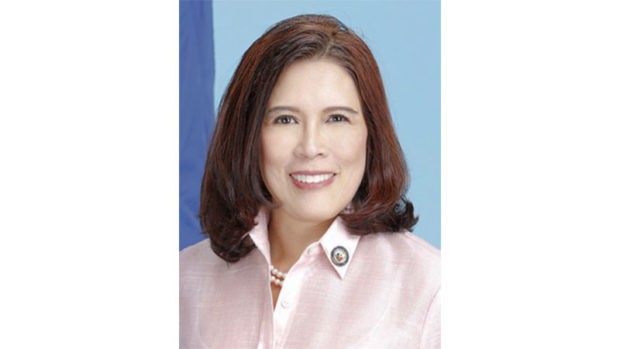House panel OKs bill institutionalizing DSWD’s food stamp program

Nueva Ecija Rep. Ria Vergara —photo from the House of Representatives website
MANILA, Philippines — A House of Representatives panel has approved a consolidated version of proposals seeking to institutionalize the Department of Social Welfare and Development (DSWD) food stamp program.
During the hearing on Tuesday, the House committee on social services approved the unnumbered substitute bill to House Bills No. 8532, 8899, 10010, and 10202—all of which seek to strengthen the DSWD’s Walang Gutom: Food Stamp Program.
According to committee chairperson and Nueva Ecija Rep. Ria Vergara, the bill is an important step toward eradicating hunger as although the food stamp program is already being implemented, it is still in a pilot program stage.
READ: Gov’t food stamp program in full blast by July
“This is an important bill because everyone feels the effects of higher inflation. So that’s what we want to adjust. We think that the original proposal of the proponent of P3,000 assistance is lacking, so the members of the committee moved to increase it by P5,000, if the budget will suffice,” Vergara said in Filipino.
Article continues after this advertisement“It is still on a pilot program but we are targeting that before the session ends, the food stamp bill is already approved (on third reading),” she added.
Article continues after this advertisementHealthy food
Under the program, qualified beneficiaries can use ‘food stamps’ or credits in an electronic benefit transfer to purchase food items through accredited retailers. The retailers sell healthy food at a combination of 50-30-20 according to Social Welfare Assistant Secretary Baldr Bringas—50 percent for carbs, 30 percent for protein, and 20 percent for fruits and vegetables
READ: DSWD food stamp program eyes 300,000 beneficiaries next year
Bringas in an ambush interview after the committee hearing said that they are looking at covering 300,000 beneficiaries by July, when the program goes into a full-scale implementation.
However, budget limitations mean that only 100,000 beneficiaries would be served if the Department of Budget and Management does not give additional funding—something that institutionalizing the program can address.
“So now as we speak, we are already gearing up for the scale of implementation of the program which will also start this July, covering 300,000 beneficiaries. So right now our social preparations are ongoing, our activities prior to the scale of implementation, we are now validating our beneficiaries who would be included in the full scale of implementation of the program,” he said.
“So far we have funds, based on our (2024) General Appropriations Act, we have an approved P1.89 billion funds,, but this can only cover 100,000 beneficiaries if we’re going to implement it from July to December. So now, we are requesting the DBM for additional funding so that we can cover the 300,000 beneficiaries,” he added.
Band-aid?
Both Vergara and Bringas insisted that the food stamp program is not a band-aid solution because it addresses one aspect of poverty.
“I don’t call it a band-aid, I think it’s a short term solution. And no, even America, they have food stamp programs, I mean poverty is a reality. Inflation is global, it’s not like we’re addressing something that’s temporary,” Vergara said.
“If this becomes a law, this food stamp program will always be part of any administration. So this is not a band-aid solution. This is just, the DSWD expanding and following best practices all over the world, so it’s long overdue, it’s not a band-aid,” she added.
Bringas then clarified that there are sessions that beneficiaries are required to attend, which aims to lift their families out of poverty.
“Our program has two conditionalities, first is the nutrition-education session. Second is the productivity enhancement session. For the first one, if you fail to attend that the nutrition-education session, the P3,000 grant to beneficiaries can be held or suspended,” Bringas explained.
“At the same time, for the productivity enhancement session, we require our beneficiaries to attend the employment promotion activities such as job fairs, to ensure that they will not be (dependent),” he added.